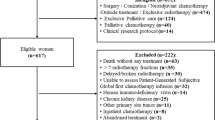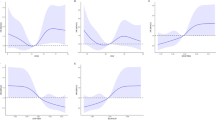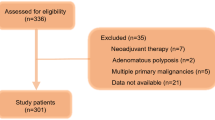Abstract
Objective: To evaluate the prognostic significance of Subjective Global Assessment (SGA) in advanced colorectal cancer and create statistically distinct prognostic groups of colorectal cancer patients based on clinical and nutritional variables.
Design: A retrospective clinical epidemiologic study.
Setting: A private tertiary care American Cancer Center.
Subjects: In total, 234 colorectal cancer patients aged 29–82 y treated at Cancer Treatment Centers of America at Midwestern Regional Medical Center between January 1995 and March 2001.
Intervention: SGA Questionnaire. SGA A—well nourished; SGA B—moderately malnourished; and SGA C—severely malnourished. Malnutrition was defined as either SGA B or SGA C.
Results: The prevalence of malnutrition in this patient population, as determined by SGA, was 52% (113/217). The median survival of patients with SGA A was 12.8 months (95% CI; 9.1–16.5), those with SGA B was 8.8 months (95% CI; 6.7–10.9) and those with SGA C was 6 months (95% CI; 3.9–8.1); the difference being statistically significant at P=0.0013. Regression tree analysis identified prior treatment history, lactate dehydrogenase (LDH) and SGA to be important predictors of survival for our patient cohort. Patients with no prior treatment history (newly diagnosed disease), low LDH scores, and SGA A had the best overall survival of 40.4 months (95% CI; 30.45–50.4), whereas patients with prior treatment history (progressive disease), high LDH scores, and SGA B/C had the worst overall survival of 4.5 months (95% CI; 2.22–6.76).
Conclusion: The SGA provides useful prognostic information in patients with advanced colorectal cancer.
Sponsors: Cancer Treatment Centers of America.
This is a preview of subscription content, access via your institution
Access options
Subscribe to this journal
Receive 12 print issues and online access
$259.00 per year
only $21.58 per issue
Buy this article
- Purchase on Springer Link
- Instant access to full article PDF
Prices may be subject to local taxes which are calculated during checkout


Similar content being viewed by others
References
Bauer J, Capra S & Ferguson M (2002): Use of the scored Patient-Generated Subjective Global Assessment (PG-SGA) as a nutrition assessment tool in patients with cancer. Eur. J. Clin. Nutr. 56, 779–785.
Carney DE & Meguid MM (2002): Current concepts in nutritional assessment. Arch. Surg. 137, 42–45.
Chang AE, Steinberg SM, Culnane M & White DE (1989): Determinants of survival in patients with unresectable colorectal liver metastases. J. Surg. Oncol. 40, 245–251.
D'Eredita G, Serio G, Neri V, Polizzi RA, Barberio G & Losacco T (1996): A survival regression analysis of prognostic factors in colorectal cancer. Aust. N. Z. J. Surg. 66, 445–451.
Detsky AS, Baker JP, Mendelson RA, Wolman SL, Wesson DE & Jeejeebhoy KN (1984): Evaluating the accuracy of nutritional assessment techniques applied to hospitalized patients: methodology and comparisons. J. Parenter. Enteral. Nutr. 8, 153–159.
Detsky AS, McLaughlin JR, Baker JP, Johnston N, Whittaker S, Mendelson RA & Jeejeebhoy KN (1987): What is subjective global assessment of nutritional status? J. Parenter. Enteral. Nutr. 11, 8–13.
Duerksen DR, Yeo TA, Siemens JL & O'Connor MP (2000): The validity and reproducibility of clinical assessment of nutritional status in the elderly. Nutrition 16, 740–744.
Ek AC, Unosson M, Larsson J, Ganowiak W & Bjurulf P (1996): Interrater variability and validity in subjective nutritional assessment of elderly patients. Scand. J. Caring. Sci. 10, 163–168.
Enia G, Sicuso C, Alati G & Zoccali C (1993): Subjective Global Assessment of nutrition in dialysis patients. Nephrol. Dial. Transplant. 8, 1094–1098.
Ferguson ML, Bauer J, Gallagher B, Capra S, Christie DR & Mason BR (1999a): Validation of a malnutrition screening tool for patients receiving radiotherapy. Australas. Radiol. 43, 325–327.
Ferguson M, Capra S, Bauer J & Banks M (1999b): Development of a valid and reliable malnutrition screening tool for adult acute hospital patients. Nutrition 15, 458–464.
Fountzilas G, Gossios K, Zisiadis A, Svarna E, Skarlos D & Pavlidis N (1996): Prognostic variable in patients with advanced colorectal cancer treated with fluorouracil and leucovorin-based chemotherapy. Med. Pediatr. Oncol. 26, 305–317.
Green S, Benedetti J & Crowley J (2003): Interdisciplinary Statistics: Clinical Trials in Oncology pp 219–224. London/Boca Raton, FL: Chapman & Hall/CRC.
Hasse J, Strong S, Gorman MA & Liepa G (1993): Subjective global assessment: alternative nutrition-assessment technique for liver-transplant candidates. Nutrition 9, 339–343.
Hawk ET, Limburg PJ & Viner JL (2002): Epidemiology and prevention of colorectal cancer. Surg. Clin. North Am. 82, 905–941.
Heys SD, Walker LG, Deehan DJ & Eremin OE (1998): Serum albumin: a prognostic indicator in patients with colorectal cancer. J. R. Coll. Surg. Edinb. 43, 163–168.
Hirsch S, de Obaldia N, Petermann M, Rojo P, Barrientos C, Iturriaga H & Bunout D (1991): Subjective global assessment of nutritional status: further validation. Nutrition 7, 35–37. discussion 37–38.
Jones CH, Newstead CG, Will EJ, Smye SW & Davison AM (1997): Assessment of nutritional status in CAPD patients: serum albumin is not a useful measure. Nephrol. Dial. Transplant. 12, 1406–1413.
Kemeny N & Braun Jr DW (1983): Prognostic factors in advanced colorectal carcinoma. Importance of lactic dehydrogenase level, performance status, and white blood cell count. Am. J. Med. 74, 786–794.
Kemeny N, Niedzwiecki D, Shurgot B & Oderman P (1989): Prognostic variables in patients with hepatic metastases from colorectal cancer. Importance of medical assessment of liver involvement. Cancer 63, 742–747.
Kouri M, Pyrhonen S & Kuusela P (1992): Elevated CA19-9 as the most significant prognostic factor in advanced colorectal carcinoma. J. Surg. Oncol. 49, 78–85.
Lindmark G, Gerdin B, Pahlman L, Bergstrom R & Glimelius B (1994): Prognostic predictors in colorectal cancer. Dis. Colon. Rectum 37, 1219–1227.
Ottery FD (1994): Rethinking nutritional support of the cancer patient: the new field of nutritional oncology. Semin. Oncol. 21, 770–778.
Ottery FD (1996): Definition of standardized nutritional assessment and interventional pathways in oncology. Nutrition 12, S15–S19.
Persson C, Sjoden PO & Glimelius B (1999): The Swedish version of the patient-generated subjective global assessment of nutritional status: gastrointestinal vs urological cancers. Clin. Nutr. 18, 71–77.
Sacks GS, Dearman K, Replogle WH, Cora VL, Meeks M & Canada T (2000): Use of subjective global assessment to identify nutrition-associated complications and death in geriatric long-term care facility residents. J. Am. Coll. Nutr. 19, 570–577.
Steinberg J, Erlichman C, Gadalla T, Fine S & Wong A (1992): Prognostic factors in patients with metastatic colorectal cancer receiving 5-fluorouracil and folinic acid. Eur. J. Cancer 28A, 1817–1820.
Thoresen L, Fjeldstad I, Krogstad K, Kaasa S & Falkmer UG (2002): Nutritional status of patients with advanced cancer: the value of using the subjective global assessment of nutritional status as a screening tool. Palliat. Med. 16, 33–42.
Waitzberg DL & Correia MI (2003): Nutritional assessment in the hospitalized patient. Curr. Opin. Clin. Nutr. Metab. Care 6, 531–538.
Wang WS, Lin JK, Chiou TJ, Liu JH, Fan FS, Yen CC, Lin TC, Jiang JK, Yang SH, Wang HS & Chen PM (2002): CA19-9 as the most significant prognostic indicator of metastatic colorectal cancer. Hepatogastroenterology 49, 160–164.
Yuste AL, Aparicio J, Segura A, Lopez-Tendero P, Girones R, Perez-Fidalgo JA, Diaz R & Calderero V (2003): Analysis of clinical prognostic factors for survival and time to progression in patients with metastatic colorectal cancer treated with 5-fluorouracil-based chemotherapy. Clin. Colorectal Cancer 2, 231–234.
Acknowledgements
This study was funded by Cancer Treatment Centers of America.
Author information
Authors and Affiliations
Corresponding author
Additional information
Guarantor: D Gupta.
Contributors: DG was the main author of the manuscript, initiated the study, collected, analyzed and interpreted data. PGV supervised the project and assisted in interpretation of results. CAL and JB assisted in writing the manuscript. CGL initiated the study and assisted in writing and interpretation. JFG supervised the project and assisted with the statistical analysis.
Rights and permissions
About this article
Cite this article
Gupta, D., Lammersfeld, C., Vashi, P. et al. Prognostic significance of Subjective Global Assessment (SGA) in advanced colorectal cancer. Eur J Clin Nutr 59, 35–40 (2005). https://doi.org/10.1038/sj.ejcn.1602029
Received:
Revised:
Accepted:
Published:
Issue Date:
DOI: https://doi.org/10.1038/sj.ejcn.1602029
Keywords
This article is cited by
-
Nutritional Assessment Tools for Patients with Cancer: A Narrative Review
Current Medical Science (2024)
-
Postoperative Nutritional Status is Predictive of the Survival Outcomes in Patients Undergoing Resection of Stage III Colorectal Cancer
World Journal of Surgery (2021)
-
The Geriatric Nutritional Risk Index predicts postoperative complications and prognosis in elderly patients with colorectal cancer after curative surgery
Scientific Reports (2020)
-
Nutritional status and its effect on complications in patients with colorectal cancer
Wiener klinische Wochenschrift (2020)
-
The determinants of reduced dietary intake in hospitalised colorectal cancer patients
Supportive Care in Cancer (2018)



